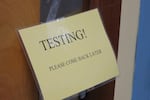
A sign on a computer lab at Portland's Abernethy Elementary School tells students and staff to stay out, while state testing takes place.
Rob Manning / OPB
Two significant reports came out Wednesday on the state tests Oregon students are required to take.
The Oregon Legislature called for both inquiries into the Smarter Balanced exams that students first took as the state's federally-required assessments in Spring 2015. Some teachers criticized the exams for the time they took, their difficulty and the technological demands, as OPB summarized in a 2015 series.
Many parents withdrew their children from the exams, drawing the ire of the US Department of Education, but also leading legislators to clarify criteria for "opting out" of required state tests.
One report is an audit from the secretary of state. It concluded the state should do a better job of explaining the purpose of the exams, while also making changes so the tests help, rather than complicate, the teaching of students.
The other report is an analysis of the test's validity, conducted by a work group of 33 educators and officials.
Related: Oregon Audit: Smarter Balanced Exams Take Up Scarce Time, Resources
The work group found that Smarter Balanced is a valid measure of student learning.
But the work group's report acknowledged major gaps in students actually reaching the high standards measured by Smarter Balanced. As a whole, Oregon students are passing Math tests only 42 percent of the time, and only 55 percent of students are passing English Language Arts. Achievement gaps based on race and income are regularly in the double-digits.
Work group member, and Tigard-Tualatin school board chair, Maureen Wolf concluded that the end-of-year or “summative” exam does a very limited job.
“The summative informs kind of collectively, as the group, what did they learn over the year," Wolf said. "But that doesn’t necessarily help the individual child progress in his or her learning throughout the year.”
The report made a few recommendations that were similar to what the secretary of state’s audit suggested. One follows the limitation Wolf identified: that school districts need more access to mid-year tests, like quizzes and midterms, aligned to state standards. The work group report says teachers could use those to better track where students need help.
The work group included some teachers who have raised questions about Oregon's approach to standardized testing, like Portland Public Schools literacy coach, Lisa Kane. She taught at PPS' Abernethy Elementary School, when significant numbers of students opted out of the exams.
"This is the first time I have seen a report that not only shows the current Oregon student assessment situation but where we as a state need to go,” said Kane.
A statement from Oregon's Deputy Superintendent of Public Instruction Salam Noor suggested the report will help guide efforts to improve assessment and instruction in the state's public schools.
Both reports also found that state officials need to do a better job of explaining the purpose of Smarter Balanced, beyond its being an accountability tool for state and federal officials.
The work group report also pushed for additional computers or training in schools where students and teachers may be less familiar with the computerized test platform.
